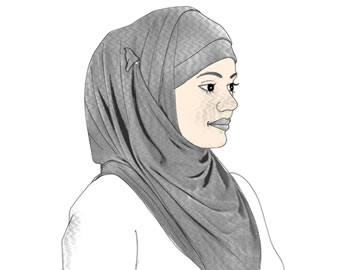fEw days ago, the hijab controversy in Osun State exacerbated when some female Muslim students and some Christian students of Baptist High School, Adeeke, Iwo, allegedly wore hijab and church garments respectively to class accompanied by some adults who stood outside the gate of the school to observe the reaction of the school authorities. But for the intervention of the Oluwo of Iwo, Oba Rasheed Akanbi, the hot arguments by those masquerading as faith champions would have snowballed into violent confrontation. The Oluwo had reportedly visited the scene of the incident and invited the warring parties to his palace where he reportedly held a peace and reconciliatory meeting with them.
Apparently, the hijab crisis which many thought had been laid to rest, especially in the midst of chronic financial crisis besetting the state, owes its resurgence to the recent judgment by Justice Jide Falola of the Osun State High Court that it is legal for Muslim students to wear hijab to school. Members of the Christian community, on the other hand, took the law into their own hands by encouraging their wards to wear church garments to school which is a clear breach of the dressing code for students in the state. They might argue that hijab was not part of the dress code for students but today, the law, by that judgement, permits it in the state. Whether the judgment is bad or good is a different matter entirely.
The good thing is that the court which seemingly legalised hijab is not a final court of arbiter; it is a High Court, and so its verdict could still be tested in the higher courts by parties that are dissatisfied with the judgment. Therefore, the alleged physical presence of some religious bigots from both faiths at Iwo Baptist High School to enforce the dress codes of their choice for their wards is ridiculous and very embarrassing in a clime where there is supposed to be law and order and the dramatis personae are expected to be exemplary in promoting peace and orderliness.
Some adherents of the Islamic faith were also said to have latched onto the court pronouncement to assume the function of the executive arm of government to enforce the law. This is evidently wrong. If the Muslim students felt that the school authorities in Osun were denying them the profit of the judgment, they should have reverted to the court for remedy rather than resorting to self-help.
Ironically, Osun State is in the South-West, a region reputed to be the bastion of religious tolerance in the country. The sociocultural perspective of the Yoruba nation necessarily promotes tolerance among different religious groups. In every extended family in the region, you are most likely to find practitioners of at least two of the principal religions, namely traditional, Islamic and Christian. It is therefore in appreciation of the region’s enlightened self-interest that South Westerners abhor religious intolerance and any attempt by any misguided persons or group to introduce it to the region should be resisted. Political leaders at their wits end sometimes appeal to primordial sentiments including religion but posterity hardly favours them. No one should create problems where there is none.
Public schools in Osun State are under the government and uniforms should be complied with. However, since the judiciary is already involved in the matter at issue, the judgment of the Osun State High Court should be appealed by the defendants if they are not satisfied with it. It is ironic that the hijab issue which has been laid to rest in more prosperous states with huge Muslim populations is what is still engaging the attention of stakeholders in Osun State, while more fundamental challenges are taking the back seat.
To be sure, the real issues that need to be tackled are those of the financial quagmire that the state is enmeshed in, perennial strike by workers in the state including teachers, poor performance of students in external examinations, how the state can be self-financing on a sustainable basis, among others. These and many more issues are not what the hijab distraction can sweep under the carpet. Government, religious leaders and indeed all stakeholders in the state are enjoined to address and resolve these fundamental challenges rather than the misguided focus on the outward appearance of students ostensibly in the defence of God who judges the heart.
WATCH TOP VIDEOS FROM NIGERIAN TRIBUNE TV
- Relationship Hangout: Public vs Private Proposals – Which Truly Wins in Love?
- “No” Is a Complete Sentence: Why You Should Stop Feeling Guilty
- Relationship Hangout: Friendship Talk 2025 – How to Be a Good Friend & Big Questions on Friendship
- Police Overpower Armed Robbers in Ibadan After Fierce Struggle





